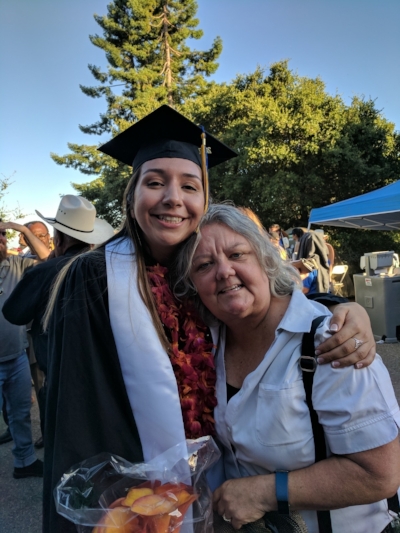By Jennifer Van Pelt
A picture of past WAWS scholar Brittany Jackson with her mentor Sarah Archibald. The picture was taken at Brittany's graduation from the University of California, Santa Cruz.
“Our chief want in life is somebody who will make us do what we can.”
-Ralph Waldo Emerson from his 1872 book: The Prose Works of Ralph Waldo Emerson: Representative Men, English Traits, Conduct of Life
Over 100 years later, this quote still rings true for people of all ages and walks of life. When we are children, parents or older siblings tend to be the person to “make us do what we can” by teaching us nearly everything they know and the art of the possible. As young adults, this figure can be a mentoring relationship with teachers or sports coaches. As an adult, this tends to be a professional mentor that you seek guidance from. At every point in one’s life, a mentor is beneficial but it can also be difficult to find someone that is willing to invest their time and commitment into someone else’s development.
What Are the Benefits of Having a Mentor?
Mentorship is beneficial at every level of one’s life to obtain an outside perspective on where the mentee can succeed, what is holding them back, and how they can improve their weaknesses to bridge the gap. Mentors can also provide intel on an industry, company, or position that you find interesting and want to learn more about for your potential future. According to mentorship.com, the following are a few more benefits of students having a mentor:
Young adults who face an opportunity gap but have a mentor are 55% more likely to be enrolled in college than those who did not have a mentor.
In addition to better school attendance and a better chance of going on to higher education, mentored youth maintain better attitudes toward school.
Students who meet regularly with their mentors are less likely than their peers to skip school.
Young adults who face an opportunity gap but have a mentor are: 81% more likely to participate regularly in sports or extracurricular activities than those who do not.
Overall, having a mentor can be the positivity in a young adult’s life that encourages them to explore the possibilities and push them to new levels, while providing honest feedback along the way. Mentors can present themselves in a variety of ways: a teacher or an extracurricular advisor, a professional that you admire, or a participant in an organized mentorship program. Every mentor will give you a unique perspective and experience once you establish a relationship.
Mentorship at Words Alive
Realizing you need a mentor or finding one once you do have the realization can be challenging. At Words Alive, we try to take the guesswork out of it by providing mentors and matching them with students. Our Westreich Scholarship Program awards scholarships for students who have participated in our Adolescent Book Group and are now pursuing a higher education at the college or vocational level. One of the key benefits included in this scholarship program is that we pair each participant with a mentor so they can regularly meet throughout their college career -- which can be a pivotal point in their lives. Students often say that the relationship with their mentors is the most valuable part of the program, and after learning about all the benefits of mentorship, it sure makes sense why!
To learn more about our Scholarships or our Adolescent Book Group, click here. For more information about Words Alive, please click here.
Sources:

